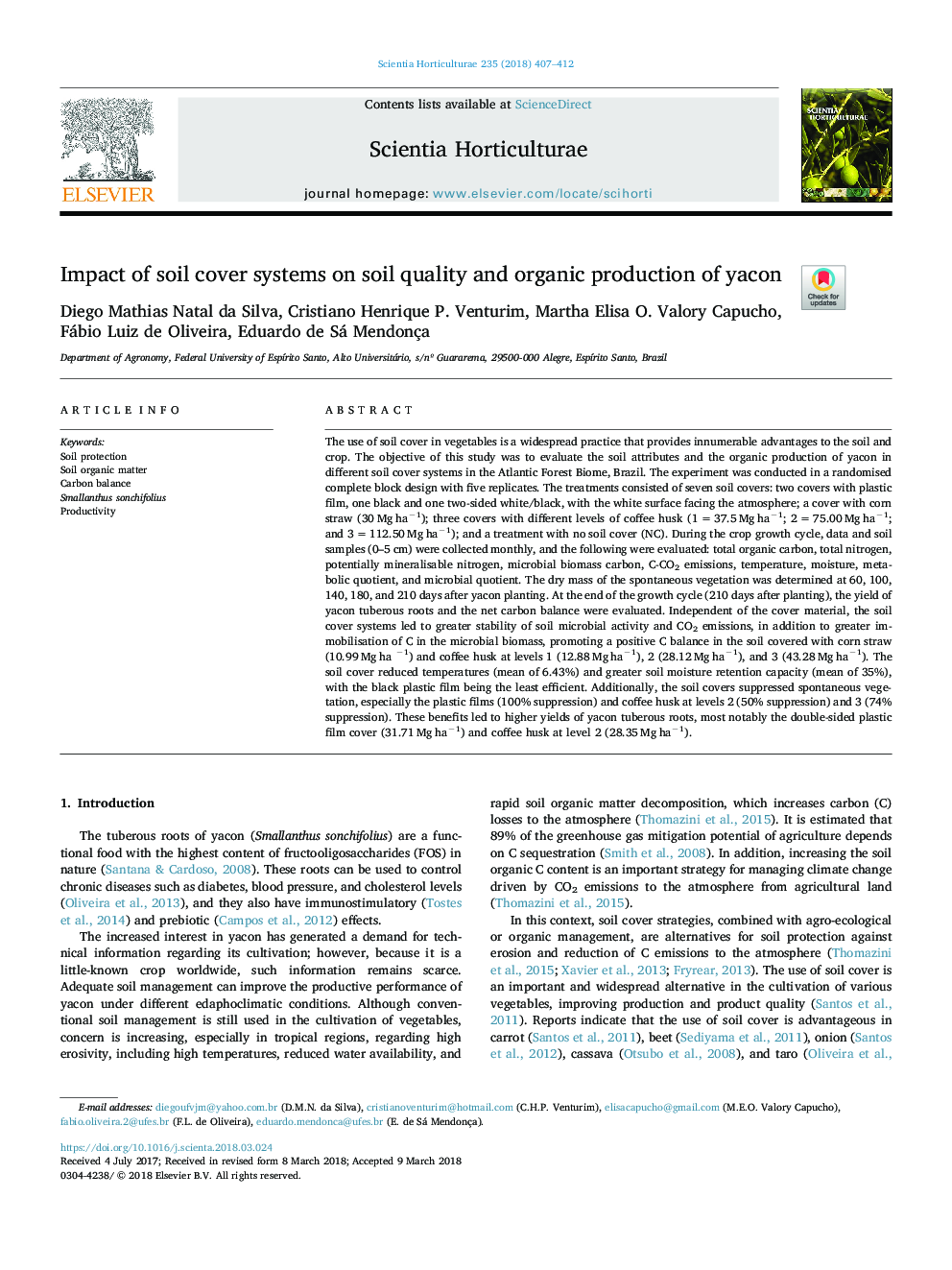| کد مقاله | کد نشریه | سال انتشار | مقاله انگلیسی | نسخه تمام متن |
|---|---|---|---|---|
| 8892722 | 1628763 | 2018 | 6 صفحه PDF | دانلود رایگان |
عنوان انگلیسی مقاله ISI
Impact of soil cover systems on soil quality and organic production of yacon
ترجمه فارسی عنوان
تاثیر سیستم های پوشش خاک بر کیفیت خاک و تولید ارگانیک
دانلود مقاله + سفارش ترجمه
دانلود مقاله ISI انگلیسی
رایگان برای ایرانیان
کلمات کلیدی
موضوعات مرتبط
علوم زیستی و بیوفناوری
علوم کشاورزی و بیولوژیک
دانش باغداری
چکیده انگلیسی
The use of soil cover in vegetables is a widespread practice that provides innumerable advantages to the soil and crop. The objective of this study was to evaluate the soil attributes and the organic production of yacon in different soil cover systems in the Atlantic Forest Biome, Brazil. The experiment was conducted in a randomised complete block design with five replicates. The treatments consisted of seven soil covers: two covers with plastic film, one black and one two-sided white/black, with the white surface facing the atmosphere; a cover with corn straw (30â¯Mgâ¯haâ1); three covers with different levels of coffee husk (1â¯=â¯37.5â¯Mgâ¯haâ1; 2â¯=â¯75.00â¯Mgâ¯haâ1; and 3â¯=â¯112.50â¯Mgâ¯haâ1); and a treatment with no soil cover (NC). During the crop growth cycle, data and soil samples (0-5â¯cm) were collected monthly, and the following were evaluated: total organic carbon, total nitrogen, potentially mineralisable nitrogen, microbial biomass carbon, C-CO2 emissions, temperature, moisture, metabolic quotient, and microbial quotient. The dry mass of the spontaneous vegetation was determined at 60, 100, 140, 180, and 210 days after yacon planting. At the end of the growth cycle (210 days after planting), the yield of yacon tuberous roots and the net carbon balance were evaluated. Independent of the cover material, the soil cover systems led to greater stability of soil microbial activity and CO2 emissions, in addition to greater immobilisation of C in the microbial biomass, promoting a positive C balance in the soil covered with corn straw (10.99â¯Mgâ¯ha â1) and coffee husk at levels 1 (12.88â¯Mgâ¯haâ1), 2 (28.12â¯Mgâ¯haâ1), and 3 (43.28â¯Mgâ¯haâ1). The soil cover reduced temperatures (mean of 6.43%) and greater soil moisture retention capacity (mean of 35%), with the black plastic film being the least efficient. Additionally, the soil covers suppressed spontaneous vegetation, especially the plastic films (100% suppression) and coffee husk at levels 2 (50% suppression) and 3 (74% suppression). These benefits led to higher yields of yacon tuberous roots, most notably the double-sided plastic film cover (31.71â¯Mgâ¯haâ1) and coffee husk at level 2 (28.35â¯Mgâ¯haâ1).
ناشر
Database: Elsevier - ScienceDirect (ساینس دایرکت)
Journal: Scientia Horticulturae - Volume 235, 17 May 2018, Pages 407-412
Journal: Scientia Horticulturae - Volume 235, 17 May 2018, Pages 407-412
نویسندگان
Diego Mathias Natal da Silva, Cristiano Henrique P. Venturim, Martha Elisa O. Valory Capucho, Fábio Luiz de Oliveira, Eduardo de Sá Mendonça,
